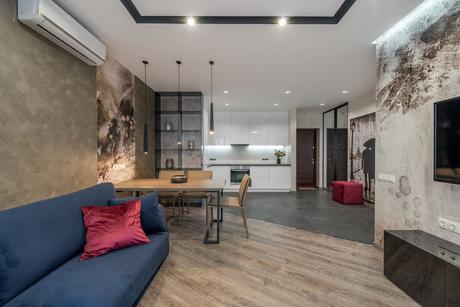An interior with an open concept is comparatively big and spacious and cuts down on separation while maximizing open space. Having an open-concept living room with a cohesive design will bring harmony throughout the entire house, making it feel cozy and welcoming.
Here's a list of tips and tricks to get you started.

Photo credit: Pexels
Including one or more color schemes and materials in your living room is one of the key aspects of making your open-concept room feel cohesive.
A symmetrical pattern and a sense of coherence can be produced by a sophisticated combination of two or three contrasting colors. A color scheme should start with a foundation, followed by contrasting colors, furnishings, and accessories.
Luxurious atmospheres use gold and silver tones, with neutral walls as focal points.
Strategic furniture arrangement may make an open-concept living room feel cozier and more personal.
To provide the impression of a smaller, cozier area that works for game evenings and conversation, try placing a 10-piece sectional sofa in the living room. It'll make for a more intimate environment.
Placing an area rug with a matching design or color is a great way to characterize the living room. Area rugs draw attention to each space, act as an anchor, and unify furniture arrangements. They can also act as visual partitions separating the functions of various rooms in large open-plan houses.
When planning your layout, the living room lighting you select might make or break the area. Matching fixtures may establish the scene, provide the ideal atmosphere, and, of course, satisfy the necessity of crucial lighting when and where it is required.
Lighting is essential for creating a good living room plan, defining spaces, and enhancing division. Direct lighting over work zones and dining tables is very effective.
Architectural features like ceiling variations, arched openings, and columnes can create depth, rhythm, and visual rest. Ornamental items like furniture, lighting fixtures, and large statues can also be used.
To control the chaos, scatter large anchors around the open area, such as a rug, accent wall color, chandelier, or sofa.
Always experiment with scale, light, and color to establish spatial hierarchy. This will give your large room an effortless, deliberate impression.
To create a cozy and welcoming space for family and friends, try layering textures, patterns, and materials. Keep furniture pieces simple and use a pallet for larger pieces. Add black wool cushions and lounge chairs for contrast, and a dark coffee table to match a dark wall.
When the base is in place, experiment with adding layers of cushions, living plants, and lighting. Anyone who enters the finished project will find it to be a cozy living room.
It might be challenging to decorate open floor plans that encompass the living room and the kitchen. Separate the kitchen and the gathering areas stylishly, enabling the views and the conversation to flow between them with ease.
Partial walls, breakfast bars, kitchen islands, columns, and dropped or raised ceilings can all be used to divide open rooms.
You can give each area its personality and ambiance. Try layering and toying with color in cushions, carpets, blankets, and artwork without overwhelming the room and losing the flow.
You can design a useful storage area that makes the most of space by using floor-to-ceiling shelf solutions. Create more room for sitting and tables by switching out several cabinets with full-height shelving systems.
The room may appear more ordered, streamlined, and large by smartly zoning the area and designating certain places for storage and seats.
Picking the right furniture enhances a living room's individuality and can separate it into various areas. Take your furniture's measurements first, then sketch down on paper how you want to use each part of the room.
By having a plan in place, you'll be able to see the end design. You'll be able to identify areas of the space where you can employ statement items and accessories to define distinct zones.
A great idea is to make the space your own by expressing your personality through various little decarative details.
